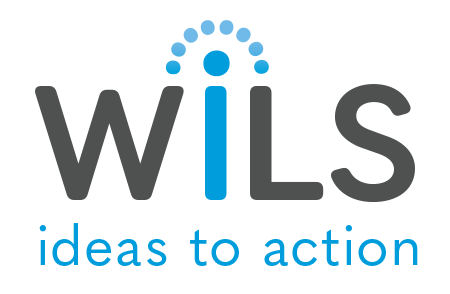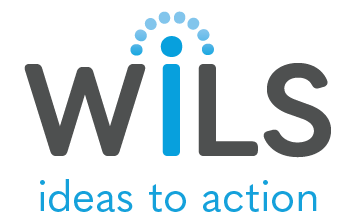
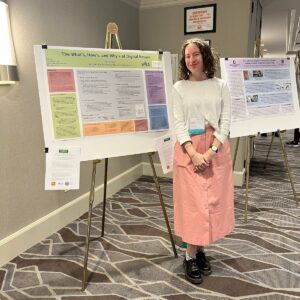
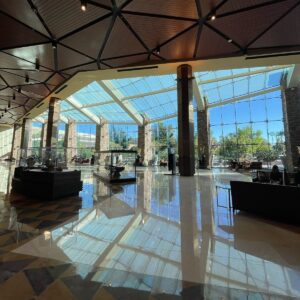
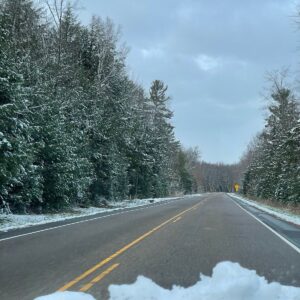
“I have learned so much about Tribal sovereignty, ethical archival work, and collaborative practices throughout the course of the last year, and I am so grateful to WiLS and the Stockbridge-Munsee Community for allowing me to learn and grow in this field.”
by Kelsie Flack
My year-long fellowship with WiLS and the Stockbridge-Munsee Community, which is part of the Curating Indigenous Digital Collections project funded by the National Endowment for the Humanities, is coming to an end and I want to reflect a bit on my work, what I have learned and gained, and how this fellowship benefitted WiLS and the Stockbridge-Munsee Community.
I began this fellowship in June of 2022, which feels like yesterday and centuries ago all at the same time. I have learned so much about Tribal sovereignty, ethical archival work, and collaborative practices throughout the course of the last year, and I am so grateful to WiLS and the Stockbridge-Munsee Community for allowing me to learn and grow in this field.
My work at the beginning of this project mainly focused on learning about the Stockbridge-Munsee Community and what I would be diving into over the course of the year. I was able to set learning goals based on the objectives and initiatives determined by WiLS and Monique Tyndall, Director of Cultural Affairs, for the Stockbridge-Munsee Band of Mohicans, which helped me hone in on which tasks I would be tackling month-to-month. We collectively determined that it was necessary to develop a solid foundation for establishing a digital collections stewardship initiative, which led me to work through the OCLC (Online Computer Library Center) Digital Collections Stewardship courses. The courses focus on each step of a digital collection lifecycle, allowing us to work through individual stages of policy-making and collection organization. This coursework has been prominent throughout the entire fellowship and it has helped me understand the structures and processes of digital collections work in a Tribal institution.
Those first few months introduced me to Mukurtu, which is an online content management system geared towards Tribal sovereignty and ethical archival access. Erin Hughes, WiLS Digital and Community Outreach Archivist, led me through the foundations of Mukurtu and how to perform each task. Mukurtu has been a solid thread throughout my work and I have really grown to love working on community and collection organization, controlled ethical access, and digital heritage content management on Mukurtu. I later had the pleasure of discussing Mukurtu with Erin and the TLAM (Tribal Libraries, Archives, and Museums) class at the UW-Madison iSchool. It was a great opportunity for me to excitedly teach other new professionals about the importance of Mukurtu and the work that it has pioneered in the world of Tribal archives, libraries, and museums.
The fall of 2022 contained two trips for me. I traveled to Temecula, California, for the international conference of the Association of Tribal Archives, Libraries, and Museums (ATALM) in October. The following month, we held the POWRR Institute with WiLS and the Stockbridge-Munsee Community. I traveled to Wisconsin from Utah for the first time and was warmly welcomed with a snow-filled trip. I spent the week meeting my colleagues in person, talking about digital collections and preservation, and spending time with Stockbridge-Munsee archival materials at the Arvid E. Miller Historical Library and Museum.
In the fall of 2022 and spring of 2023, I began working on digital return work between non-Tribal repositories and the Stockbridge-Munsee Community. This has been my favorite project that I have worked on during my fellowship. Digital return is the return of cultural heritage materials back to the communities that they come from in the form of digital copies, in the context of continuing relationships based in Tribal sovereignty and governance. It is an important and necessary step for the decolonization of archives, libraries, and museums. This work consists of researching and contacting various non-Tribal repositories, communicating with them regarding materials of interest, documenting conversations and materials discussed, receiving digital surrogates, and finally, enabling the Stockbridge-Munsee Community to improve access to digital cultural heritage materials for Tribal Members and educators who serve the Tribal Community or are located on traditional Mohican or Munsee-Speaking Lenape lands.
I had the opportunity to present a poster on this digital return work at the Midwest Archives Conference in Chicago in April 2023, which was a great experience and a way to raise awareness about the importance of this work for Tribal communities and archives. I then traveled from Chicago to Madison to work with the WiLS team in person, where I was able to continue digital return work by physically visiting non-Tribal repositories and connecting with other archivists in Madison. It was a joy to visit Wisconsin again and connect with the WiLS staff that I had previously only seen through a computer screen for the last year!
This fellowship was truly a dream come true and the perfect way for me to start my career. The rest of my professional life has some huge shoes to fill after this incredible experience with WiLS and the Stockbridge-Munsee Community. I learned an immense amount of invaluable lessons about Tribal archival work, collaboration, and digital collections initiatives that will remain important to me throughout all of my professional ventures in the future.
